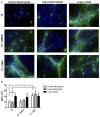Proteins derived from neutrophil extracellular traps may serve as self-antigens and mediate organ damage in autoimmune diseases
- PMID: 23248629
- PMCID: PMC3521997
- DOI: 10.3389/fimmu.2012.00380
Proteins derived from neutrophil extracellular traps may serve as self-antigens and mediate organ damage in autoimmune diseases
Abstract
Neutrophils are the most abundant leukocytes in circulation and represent one of the first lines of defense against invading pathogens. Neutrophils possess a vast arsenal of antimicrobial proteins, which can be released from the cell by a death program termed NETosis. Neutrophil extracellular traps (NETs) are web-like structures consisting of decondensed chromatin decorated with granular and cytosolic proteins. Both exuberant NETosis and impaired clearance of NETs have been implicated in the organ damage of autoimmune diseases, such as systemic lupus erythematosus (SLE), small vessel vasculitis (SVV), and psoriasis. NETs may also represent an important source of modified autoantigens in SLE and SVV. Here, we review the autoimmune diseases linked to NETosis, with a focus on how modified proteins externalized on NETs may trigger loss of immune tolerance and promote organ damage.
Keywords: NETs; autoimmunity; citrullination; neutrophil; posttranslational modifications; psoriasis; systemic lupus erythematosus (SLE); vasculitis.
Figures

References
-
- Abramson S. B., Given W. P., Edelson H. S., Weissmann G. (1983). Neutrophil aggregation induced by sera from patients with active systemic lupus erythematosus. Arthritis Rheum. 26, 630–636 - PubMed
Grants and funding
LinkOut - more resources
Full Text Sources
Other Literature Sources

